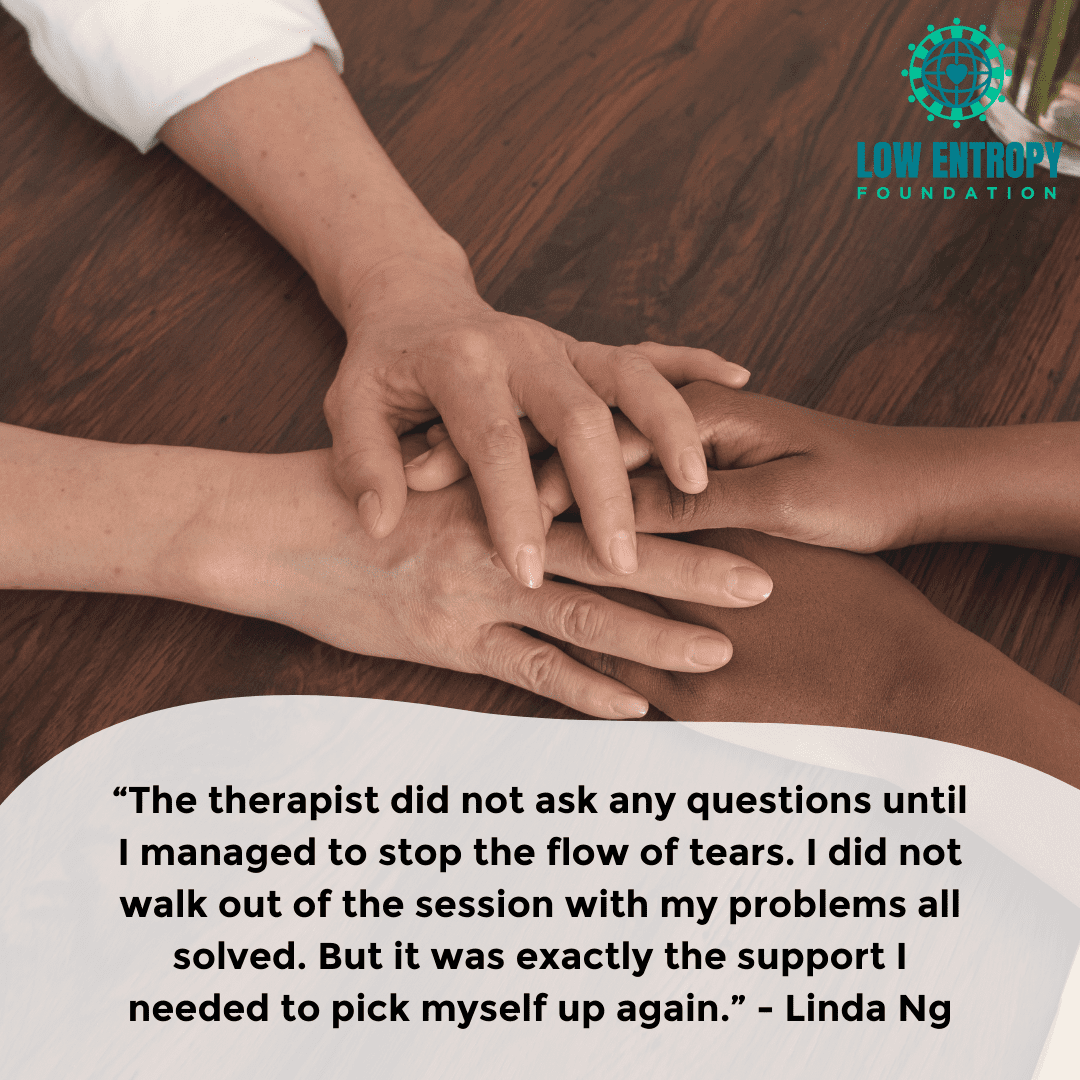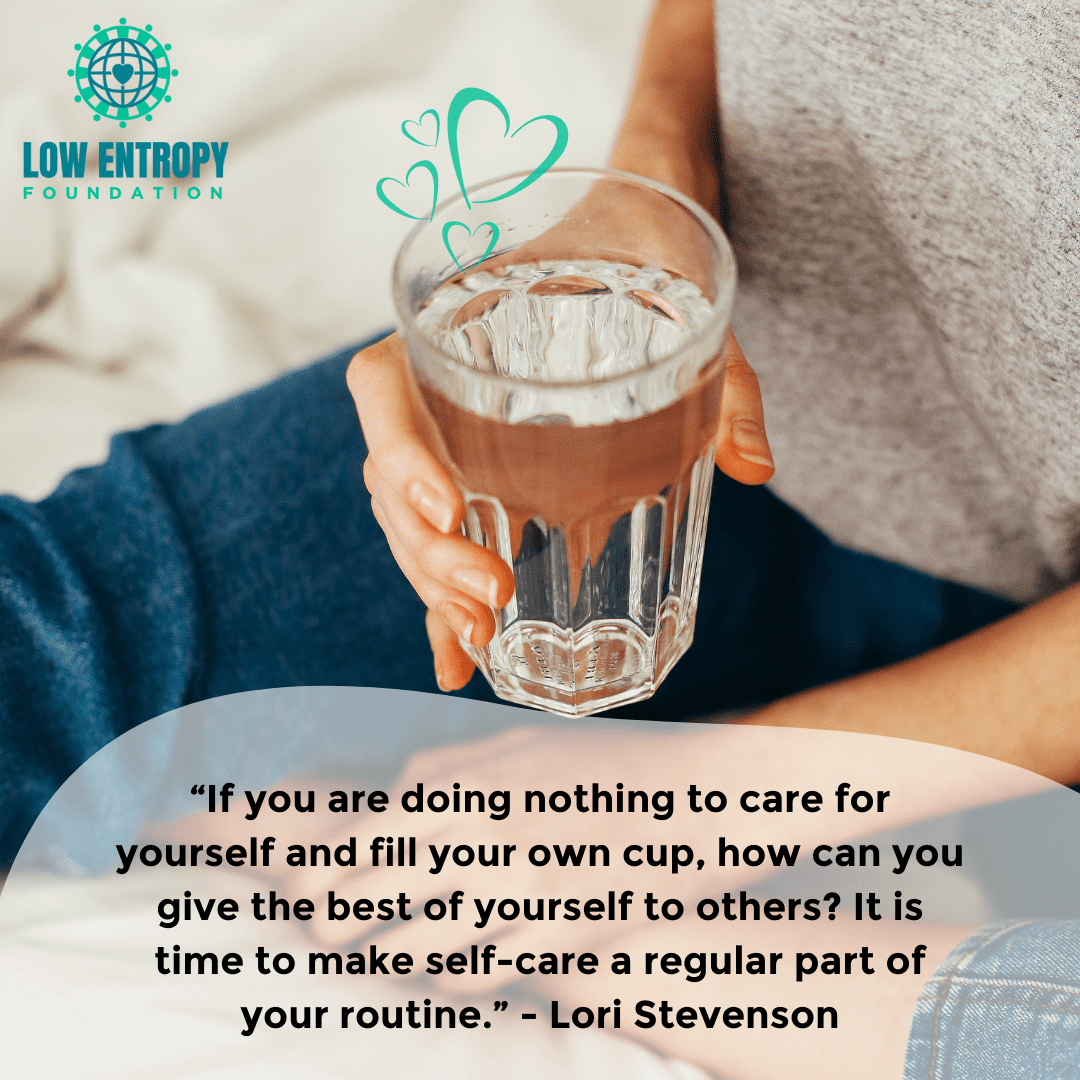Linda Ng, Low Entropy Volunteer Writer
Therapy. This short and simple word has so many negative connotations tied to it. People imagine that those who seek therapy are the crazy ones. They are the ones who have been diagnosed with mental disorders, their bathrooms filled with piles of medication to control their symptoms. I beg to differ. There are a wide range of reasons that a person might seek therapy. It can be for stress-related issues or relationship problems. Perhaps they are simply struggling through a challenging period in their lives.
Even if we are sprinting, it appears as if our ever-changing world is evolving at a mind-boggling pace. The pressures of success, daily life and the demands of society are exceedingly overwhelming to the average person. It is almost as if we are constantly dealt from a losing deck of cards, fighting every minute to get through the day. I am no exception. Just a few years ago, the pressures of life led me into a near-breakdown. Like many people in the world who are experiencing the same thing, I felt helpless and alone. It was one of the most difficult times of my life, filled with hopelessness and despair. When I started to contemplate the meaning of life, I knew I needed help. It would not have been resolved with a hot bath or a box of chocolates.
My Experience with Therapy
I sought an unbiased perspective, a person who would sit and listen to me pour my heart out. I was reluctant to speak to friends or family. Instead, I decided to turn to therapy. I enlisted the services of a psychotherapist and set up my appointment.
Within five minutes of my first session, I started bawling out my life story. At that point, I knew I had done the right thing. To reveal such a personal and emotional side of myself to a stranger was not easy. Yet, because I was already at a breaking point in my life, it came so effortlessly to me. The therapist did not ask any questions until I managed to stop the flow of tears. I did not walk out of the session with my problems all solved. But it was exactly the support I needed to pick myself up again.
Negative Views of Therapy
Society has somehow managed to attribute therapy to many negative implications, such as believing that there is something wrong with you or that you cannot handle your life. On the contrary, I believe that therapy is for everyone and anyone. The services of a licensed psychotherapist can be enlisted for a wide range of concerns, not only for common disorders like anxiety or depression. If you have something you can’t deal with in your life or if you’re generally feeling lost in life, you can seek therapy. It is the best thing you can do to help yourself out during tough times.
Life can be incredibly difficult. It’s almost like a roller coaster, where we are pitched into euphoric highs and then mercilessly thrown into the stomach-wrenching lows. To handle this wild roller coaster ride in life, we need to understand when and how to administer self-care.
How Therapy Can Help
A therapist provides a pathway for what I like to call a “brain dump.” Can we even count the number of thoughts that we have in a day? Our brain is constantly processing information and forming new memories. If we don’t give our brains a chance to release these thoughts and unload, we are paving the way for an eventual breakdown. All I can envision is a volcano filled to the brim with hot lava, ready to erupt at the slightest trigger.
There are several ways of unloading thoughts. Journalling or writing a diary are common choices. Others choose to speak with friends or perhaps even resort to bottling it up inside. I believe that there should be more focus on therapy and counselling as an option. It is not that we cannot be adults and get through life, or that there is something wrong with our brains. We can think of therapy as a gentle, guiding hand to lead us out when we have lost our way.
The stresses that we encounter in our society today are very real. We cannot deny that there is an increasing demand for mental health support. Learning to embrace and accept therapy is a step in the right direction. Allowing negative emotions or issues to build up and fester inside of you is never the right choice for our mental health. We get rid of physical toxins from our bodies by sweating or working out. We need to do the same for our brains. Let’s begin by taking the negativity and stigma out of therapy and counselling. It is time to take care of yourself.
—
My name is Linda and I’m from Canada! When I’m not writing, I enjoy travelling, playing badminton and spending time with my pets. I have a strong passion for self-improvement and mental health topics. I’m hoping to share that with you here at Low Entropy!








